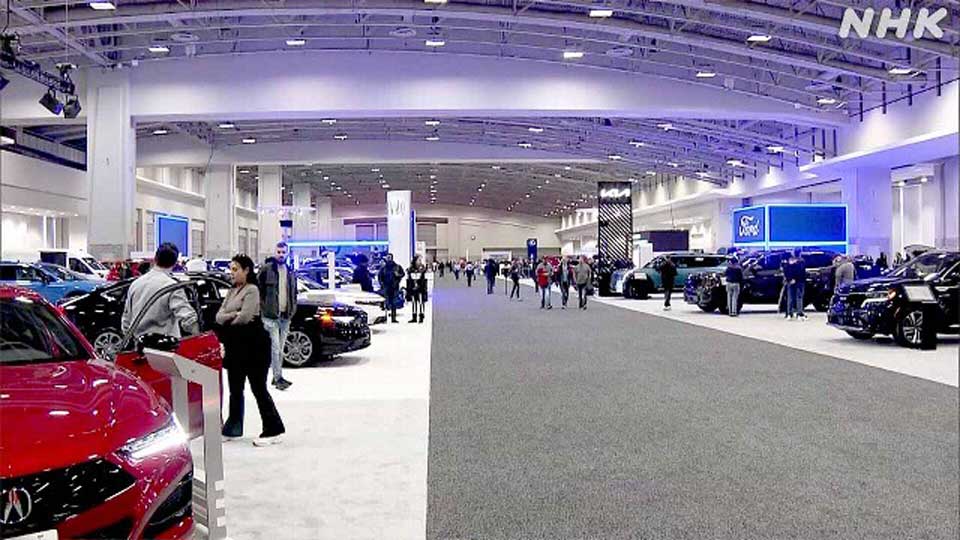Numbers reflect attitudes
In January, car rental giant Hertz announced that it would sell its fleet of approximately 20,000 EVs and reinvest in gasoline-powered vehicles.
The company said the move was about improving profitability by listening to customers' preferences.

At the same time, EV specialist Tesla revealed that its operating profit for the three months ending December 2023 was down nearly 50 percent from the same period a year earlier.
This was mainly due to intensified competition with other automakers amid slowing demand growth and pressure to lower prices.
Other automakers have also announced reductions in investment in EVs.
General Motors has postponed the start of EV production at its plant in Detroit by one year, and Ford is conducting a review of its 12 billion dollar EV investment.

Hybrids in the spotlight
The Washington, D.C. Auto Show is an annual event that has been running for more than 100 years. While EVs have been the focus of attention in recent times, visitors this year were more interested in hybrids.

One woman considering a hybrid vehicle from a Japanese manufacturer said: "I like the eco-friendly technology and the fact that it saves me money on gas. I travel about 10 hours to Atlanta or New Hampshire three or four times a year, so an EV that takes a long time to recharge is not an option."
Another potential customer said, "EVs are still too expensive, and I'm not sure about the charging facilities."


Their sentiments seem to be shared by many. Demand for hybrid vehicles is growing rapidly in the US. The 1.24 million units sold in 2023 was a more than 65 percent jump from the previous year and the first increase in two years.
In contrast, EV sales for 2023 totaled just over 1.07 million vehicles, a 51 percent increase compared with 2022. Hybrid vehicles surpassed EVs in both sales volume and growth rate.
Joe Koch, assistant producer of the Washington, D.C. Auto Show, explains that the early adopters, the people who are always first to purchase new technologies and products, have stopped buying EVs.
Koch says many consumers are put off by the high price for EVs, as well as limited charging access. They are increasingly opting for hybrids, which are more fuel-efficient and offer greater environmental benefits than gasoline-powered vehicles.
"People are understanding that there are some drawbacks to electric cars," he explains. "Electric vehicles can work for a lot of people in a lot of different situations. But maybe you don't have charging at your home because you live in an apartment. Maybe you don't have charging at your workplace for whatever reason, or it's difficult to charge the vehicle on a daily basis.
"A hybrid vehicle can give you the flexibility with battery power, it's inexpensive and clean for short trips, but you still have gas for a backup, and most of the hybrid vehicles get very good fuel economy as well."

'Hybrid Renaissance'
Hybrid vehicles combine two types of power: a combustion engine and an electric motor. In 1997, Toyota Motor was the first in the world to begin mass production.
The hybrid car's image was environmentally friendly, and it became the vehicle of choice in Hollywood. That star-power rubbed off and the Toyota Prius remains popular to this day.
It's not enough, however, for the state of California, the leader in environmental policy in the US, which is pushing for all-EVs as they do not emit carbon dioxide. In 2022, California legislated to ban all sales of new hybrid cars as well as gasoline cars after 2035.
It is a headwind that drivers look set to take on. The New York Times published a story in January headlined "Hybrid Cars Enjoy a Renaissance as All-Electric Sales Slow", arguing that slowing EV sales and strong hybrid sales highlight a new reality.
The article quoted a Toyota North America executive saying, "At the end of the day, the consumer drives this industry, not the manufacturer."

Tax benefits for EV purchasers
To encourage the adoption of EVs, which are still expensive, the Biden administration has a program to provide buyers with tax incentives of up to 7,500 dollars per car.
From January, the benefit is available at the time of purchase in a change from previous rules which made purchasers wait for the following year's tax return. But conditions for eligibility have been tightened, and the number of vehicles for which the benefit can be applied has narrowed.
The tax credit is no longer applicable for vehicles that use storage batteries produced by companies or groups in which Chinese or Russian capital accounts for a 25 percent stake of more.
The November presidential election could further influence the situation. If Donald Trump, who is skeptical of EVs, regains power, he may steer away from the Biden administration's policies to promote them.

Strategies for the future
Despite the recent consumer-driven turn to hybrid, EV sales in the US are still increasing, with zero-emission cars key in the fight against climate change.
Japanese automakers, beneficiaries in the hybrid rebound, are also investing heavily in EVs. But ultimately, production and sales strategies need to take into account what drivers want.


